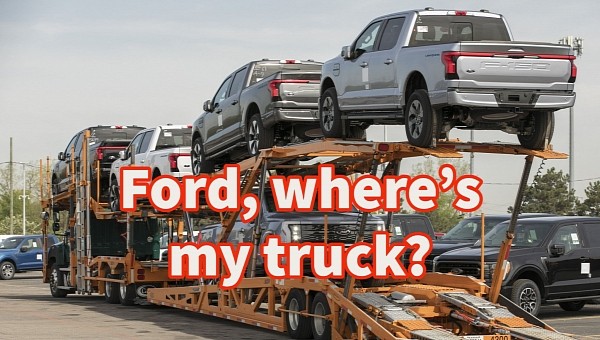Ford had to admit to a battery fire when it halted the F-150 Lightning production in the first week of February. Since then, the production line has remained idle as Ford and SK On, the battery cell supplier, looked for solutions. New reports indicate that Ford has decided to resume production on March 13. However, it would continue holding already produced vehicles as it tries to solve the problem that caused the fire.
A Ford F-50 Lightning caught fire in a holding lot on February 4 while awaiting final inspection, and Ford decided to halt production until it found out the cause and how to eliminate it. Although Ford did not admit it at first, the fire started from the truck's battery, and reports indicated that it was a cell rather than a battery pack issue. This puts the blame on SK On as the cell supplier and further complicates things. There are probably tens of thousands of faulty battery cells already produced, and some of them have already been assembled into battery packs.
The production halt at Ford's Rouge EV Center in Michigan is entering the second month, which must be painful for the Blue Oval. A Ford statement sent to media last week indicates that Ford will resume F-150 Lightning production on March 13. Of course, starting anything on 13 is not a good omen, especially as Ford doesn't appear to have a solution to the battery problem. Ford intends to produce the F-150 Lightning but keeps the trucks on hold as it works out a fix.
"We will restart production at the Rouge Electric Vehicle Center (REVC) on March 13, allowing time for SK On's battery cells to be built into battery arrays and packs and be delivered to the Lightning production line," writes Ford's statement. [...] "As REVC ramps up production, we will continue holding already-produced vehicles while we work through engineering and parts updates."
If anything, the wording seems to imply that Ford will resume production even though it doesn't have the battery packs for the newly built Lightnings. That should be the reason the trucks are undeliverable. It is unclear what the problem was in the first place and what SK On was doing to address it. It might also mean that there's still no solution for now, and SK On needs more time to find one, but it expects to ramp up quickly once it nails it.
Nevertheless, this problem dealt a blow to Ford's plans to prioritize EV production, as it announced around the same time. Ford wants to triple F-150 Lightning production in 2023 to 150,000 units, but it's unclear how it will achieve this. Ford needs a heck of a production ramp-up to compensate for the five-week lost production. We're unsure it even wants to do that, considering the Blue Oval loses around $1,000 with every electric truck it sells. Fewer sales, smaller losses.
SK On's batteries have never been the subject of a recall, although it uses roughly the same technology as LGES, which caused the Chevy Bolt disaster. SK On insists that the battery problem plaguing the F-150 Lightning was a rare occurrence, not a fundamental issue with the technology of the battery cells or its manufacturing system.
The production halt at Ford's Rouge EV Center in Michigan is entering the second month, which must be painful for the Blue Oval. A Ford statement sent to media last week indicates that Ford will resume F-150 Lightning production on March 13. Of course, starting anything on 13 is not a good omen, especially as Ford doesn't appear to have a solution to the battery problem. Ford intends to produce the F-150 Lightning but keeps the trucks on hold as it works out a fix.
"We will restart production at the Rouge Electric Vehicle Center (REVC) on March 13, allowing time for SK On's battery cells to be built into battery arrays and packs and be delivered to the Lightning production line," writes Ford's statement. [...] "As REVC ramps up production, we will continue holding already-produced vehicles while we work through engineering and parts updates."
If anything, the wording seems to imply that Ford will resume production even though it doesn't have the battery packs for the newly built Lightnings. That should be the reason the trucks are undeliverable. It is unclear what the problem was in the first place and what SK On was doing to address it. It might also mean that there's still no solution for now, and SK On needs more time to find one, but it expects to ramp up quickly once it nails it.
Nevertheless, this problem dealt a blow to Ford's plans to prioritize EV production, as it announced around the same time. Ford wants to triple F-150 Lightning production in 2023 to 150,000 units, but it's unclear how it will achieve this. Ford needs a heck of a production ramp-up to compensate for the five-week lost production. We're unsure it even wants to do that, considering the Blue Oval loses around $1,000 with every electric truck it sells. Fewer sales, smaller losses.
SK On's batteries have never been the subject of a recall, although it uses roughly the same technology as LGES, which caused the Chevy Bolt disaster. SK On insists that the battery problem plaguing the F-150 Lightning was a rare occurrence, not a fundamental issue with the technology of the battery cells or its manufacturing system.








